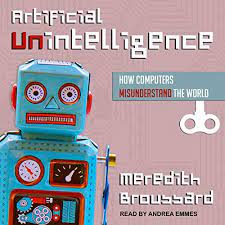
'Artifical Unintelligence' - a Review
Is new tech always a good thing? Not necessarily. Computers get it wrong a lot more than we think.
“Artificial Unintelligence: How Computers Misunderstand the World” is a book by Meredith Broussard, a computer scientist, data journalist, and professor at New York University. It serves as a reminder that AI and new other technology are not automatically better than what comes before because systems are designed and programmed by humans with their own biases and limitations, which are then reflected in the algorithms and data sets used by AI.
I like how Broussard challenged the idea that new tech is always better. As a society, we often jump to the conclusion that the best way to fix an issue is to automate or make something more high-tech, a phenomenon she calls “Technochauvanism.” Broussard claims that sticking to a brick-and-mortar or pencil-and-paper approach is sometimes still a better option; people use a lack of advanced tech as a scapegoat for the real problems. For example, she shared an example of how a school didn’t have access to books for all the kids, so someone suggested that they go digital, and get each kid their own computer. Broussard in this scenario disagreed- the problem isn’t that paper books weren’t working, it was a lack of coordination to get children the resources they needed. If the district was able to put energy into upgrading textbooks to laptops, they could put that same energy into simply getting the necessary books and be just the same or even better off. She has other stories similar to this and helps readers think about areas in education or work that could be improved with adjustments other than technological.
The largest drawback of this book to me is that Broussard sometimes has a negative tone about the use and advancement of AI, which almost turns the reader against AI at times. I agree with her main arguments that the grass is not always greener on the advanced technology side and that computers are often programmed to be systematically biased, but I believe she could have highlighted more of the benefits of advanced algorithms. It was published almost four years ago, and times have changed a bit since then (I wonder what she thinks of Chat GPT?), so she hadn’t lived through much of the recent pro-AI innovations. My gripe is that her book might have made me weary to use chat GPT (it’s improved my work and school lives immensely already) if I read it before this year. It could make others hesitant to accept helpful innovations as well.
Overall, this book is a though is a thoughtful look into the value of AI and other technology in our lives. Despite my small hangups with her tone at certain points, I enjoyed this book and think Broussard did a brave thing by explaining how society gets it wrong with technology. We get so fixed in our perceptions of the way things are, so calling out the fact that computers aren’t always perfect or necessary is important. She makes it interesting by sharing stories and examples, both from her own career and from others, that put her ideas and claims into perspective. I would not recommend this book to someone who has no interest in technology (perhaps the older generation) because they might get bored or apathetic. I would highly recommend it to someone who is either overwhelmed by tech, or to a young professional interested in the capabilities of AI. It would be good for the first type of person because it could help them understand when advanced algorithms are necessary and when solutions could be found in other ways. The second, tech-savvy person could very well be creating new technology one day, so it would be good for them to understand its limitations and biases, or at the least understand when to employ new technology in their jobs.
Rating: 4/5 Stars
